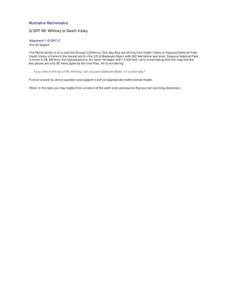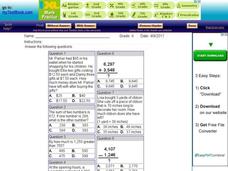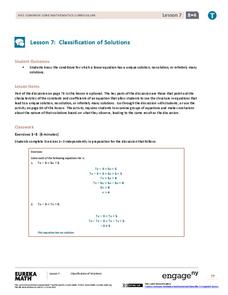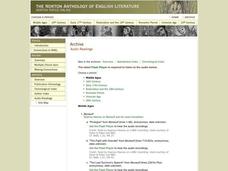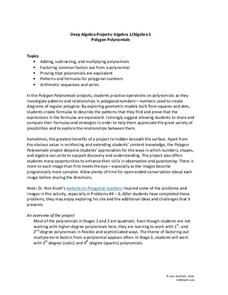Curated OER
Mt. Whitney to Death Valley
This is an intriguing problem that brings together real-world data, technology, and mathematical problem solving. If visibility wasn't an issue, could you see from the highest point in the lower 48 states, Mt. Whitney, to the lowest...
Curated OER
Integrated Algebra/Math B Regents Questions: Exponential Equations
In this exponential equations learning exercise, students solve 11 word problems in short answer and multiple choice format. Students write and solve exponential growth and decay problems given a word problem.
Curated OER
Math Word Problems
In this single and multiple-step word problems activity, students add, subtract, and convert inches and yards to solve. Students solve 10 problems.
Curated OER
Introduction to Conics
Just exactly where does the name conic come from? This brief hands-on exploration explains it all. Have your class cut cones to create their own conics, then assess their understanding with a few identification problems. Consider making...
EngageNY
Comparison of Numbers Written in Scientific Notation and Interpreting Scientific Notation Using Technology
Examine numbers in scientific notation as a comparison of size. The 14th lesson in the series asks learners to rewrite numbers as the same power of 10 in scientific notation to make comparisons. Pupils also learn how to use a calculator...
EngageNY
Classification of Solutions
Is there one, none, or more? Through discussion or activity, scholars find the properties of an equation that will determine the number of solutions. They then use the properties discovered to figure out the number of solutions for a...
EngageNY
The Structure of Ratio Tables—Additive and Multiplicative
Build tables by understanding their structure. Scholars take a closer look at the structure of ratio tables in the 10th segment in a 29-part series. Individuals realize that the tables can be built using an additive or multiplicative...
EngageNY
Describing Variability Using the Interquartile Range (IQR)
The 13th instructional activity in a unit of 22 introduces the concept of the interquartile range (IQR). Class members learn to determine the interquartile range, interpret within the context of the data, and finish by finding the IQR...
Curated OER
Math Club Problems #12
In this math club problems #12 worksheet, 8th graders solve 6 math puzzles about number patterns, drawing lines, adding sums, and family ages using logic and problem solving skills.
Illustrative Mathematics
Quinoa Pasta 1
Here is a great opportunity to introduce your mathematicians to a food they may never have heard of, quinoa. It may help to show a short video on quinoa, or make some quinoa for the class to try. Once they get over how to say quinoa,...
Mt. San Antonio Collage
Quadratic Functions and Their Graphs
Starting with the basics, learners discover the features of a parabola and the ways to accurately graph it. After pupils practice with graphing, the end of the learning exercise focuses on application type problems.
EngageNY
Read Expressions in Which Letters Stand for Numbers
Pencil in the resource on writing verbal phrases into your lesson plans. The 15th installment of a 36-part module has scholars write verbal phases for algebraic expressions. They complete a set of problems to solidify this skill.
Illustrative Mathematics
Right Triangles Inscribed in Circles I
One of the basic properties of inscribed angles gets a triangle proof treatment in a short but detailed exercise. Leading directions take the learner through identifying characteristics of a circle and how they relate to angles and...
EngageNY
Interpreting Quadratic Functions from Graphs and Tables
Seeing functions in nature is a beautiful part of mathematics by analyzing the motion of a dolphin over time. Then take a look at the value of a stock and maximize the profit of a new toy. Explore the application of quadratics by...
EngageNY
The Relationship Between Visual Fraction Models and Equations
Ours is to wonder why, not just to invert and multiply. The seventh installment of a 21-part module uses fraction models to help pupils understand why the invert-and-multiply strategy for dividing fractions works. They then work on some...
Curated OER
Open-Ended; Joining (Addition), Part-Part-Whole
Given a budget, a list of items to put in a treat bag, and how much each item costs might be a little difficult for your students at first. However, these are all going into a treat bag for Madeline's friends. What would your learners...
Balanced Assessment
Initials
Learners explore the meaning of groups formed through permutations and combinations with an activity that asks individuals to determine the total number of pupils needed to guarantee that at least one pair has the same initials. They...
EngageNY
Average Rate of Change
Learners consider the rate of filling a cone in the 23rd installment of this lesson series. They analyze the volume of the cone at various heights and discover the rate of filling is not constant. The lesson ends with a discussion of...
California Education Partners
Least and Greatest
Squares can be magic. Pupils use their knowledge of addition of positive and negative rational numbers to create a 3 X 3 magic square where the sums are 1. Scholars create addition and multiplication expressions with a set of rational...
Achieve
Corn and Oats
How much land does a parcel hold? How much fertilizer does it take for a field of corn? Pupils answer these questions and more as they apply ratio reasoning and unit analysis.
5280 Math
Polygon Polynomials
Patterns in polygons lead to patterns in polynomials. Presented with a series of polygons, individuals create polynomial expressions to represent their patterns. The algebra project consists of nine problems that incorporate polynomial...
Balanced Assessment
Red Dots, Blue Dots
Count the connections between dots. Young mathematicians come up with a method to determine the number of connections between pairs of dots. The assessment leads the class to determine the connections they can make when groups are...
5280 Math
Multiplication Table Algebra
Patterns, patterns, everywhere! Young scholars examine the multiplication table to identify patterns. Their exploration leads to an understanding of the difference of squares and sum of cubes by the completion of the algebra project.
Fredonia State University of New York
Watch Your Step…You May Collide!
Can two lines intersect at more than one point? Using yarn, create two lines on the floor of the classroom to find out. Cooperative groups work through the process of solving systems of equations using task cards and three different...


